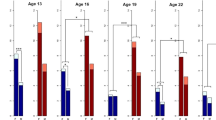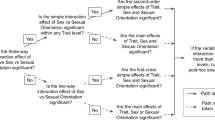Abstract
The purpose of the present survey study was to investigate the relationship between life satisfaction and sex-role concept. Two hundred and seventeen respondents completed a two-part questionnaire, which consisted of the Life Satisfaction Survey, designed by the authors, and the Bem Sex Role Inventory. General satisfaction with life was found to be a function of the level of satisfaction derived from various aspects of life, particularly aspects chosen as the most important. Consistent with previous studies, general satisfaction with life is positively associated with education level, income level, and being married. In contrast to previous findings, age is not negatively correlated with overall satisfaction, and a significant difference between males and females showed up. As predicted, sex-role concept was found to be a useful construct in explaining the differential importance of various domains of life as well as the relative contribution of those domains to the individual's overall satisfaction with life. Psychologically masculine people choose as important and enjoy more the instrumental aspects of life; psychologically feminine people choose as important and enjoy more the socioemotional aspects of life; psychologically androgynous people choose as important and enjoy more both the instrumental and socioemotional aspects of life.
Similar content being viewed by others
References
Andrisani, D., & Shapiro, M. Women's attitudes toward their jobs. Some longitudinal data on a national sample. Personnel Psychology, 1978, 31, 15–34.
Bart, P. Mother Portnoy's complaint. Trans-Action, 1970, 9, 67.
Bem, S. L. The measurement of psychological androgyny. Journal of Consulting and Clinical Psychology, 1974, 42, 155–162.
Bem, S. L. Androgyny vs. tight little lives of fluffy women and chesty men. Psychology Today, 1975, 9, 58–59.
Bem, S. L., & Lenney, E. Sex-typing and avoidance of cross-sex behavior. Journal of Personality and Social Psychology, 1976, 33(1), 48–54.
Bernard, J. The future of marriage. New York: World Books, 1972.
Bradburn, N. M. The structure of psychological well being. Chicago: Aldine, 1969.
Bradburn, N. M., & Caplovitz, D. Reports on happiness. Chicago: Aldine, 1965.
Campbell, A., Converse, P., & Rodgers, W. The quality of American Life. New York: Russel Sage, 1976.
Cantril, H. The pattern of human concerns. Princeton: Princeton University Press, 1965.
Feld, S. O. Feeling of adjustment. In F. I. Nye, & L. W. Hoffman (Eds.), The employed mother in America. Chicago: Rand McNally, 1963.
Ferree, M. The confused American housewife. Psychology Today, 1976, 10, 76–80.
Gove, W. R. The relationship between sex roles, marital status, and mental illness. Social Forces, 1972, 51, 34–44.
Gurin, G., Veroff, J., & Feld, S. Americans view their mental health. New York: Basic Books, 1960.
Hall, D. T., & Gordon, F. E. Career choices of married women: Effects on conflict, role behavior, and satisfaction. Journal of Applied Psychology, 1973, 58(1), 42–48.
Kalin, R. Method for scoring androgyny as a continuous variable. Psychological Reports, 1979, 44, 1205–1206.
Lundberg, F., & Farnham, M. Modern women: The lost sex. New York: Harper, 1965.
Orden, S. R., & Bradburn, N. M. Working wives and marriage happiness. The American Journal of Sociology, 1969, 74, 392–407.
Rice, R. W., Near, J. P., & Hunt, R. G. Unique variance in job and life satisfaction associated with work-related and extra-workplace variables. Human Relations, 1979, 32(7), 605–623.
Scanconi, J. H. Sex roles, lifestyle, and childbearing. New York: Free Press, 1975.
Sharp, L. J., & Nye, F. I. Maternal mental health. In F. I. Nye, & L. W. Hoffman (Eds.), The employed mother in America. Chicago: Rand McNally, 1963.
Veroff, J. & Feld, S. Marriage and work in America: A study of motives and roles. New York: Van Nostrand, 1970.
Wright, J. D. Are working women really more satisfied? Evidence from several national surveys. Journal of Marriage and the Family, 1978, 40(2), 301–314.
Author information
Authors and Affiliations
Additional information
The research presented here was supported by NSF Grant 77-160107, principal investigator Morton Deutsch. The authors wish to thank Morton Deutsch and Gary Bridge for their guidance and helpful comments on earlier drafts of this article. The assistance of Gidi Shichman. Kenneth Kressel, Joan Grosser, Lotti Tartell, Derry Ann Moritz, and Trinity Church on the Green—New Haven is also gratefully acknowledged.
Rights and permissions
About this article
Cite this article
Shichman, S., Cooper, E. Life satisfaction and sex-role concept. Sex Roles 11, 227–240 (1984). https://doi.org/10.1007/BF00287516
Issue Date:
DOI: https://doi.org/10.1007/BF00287516




